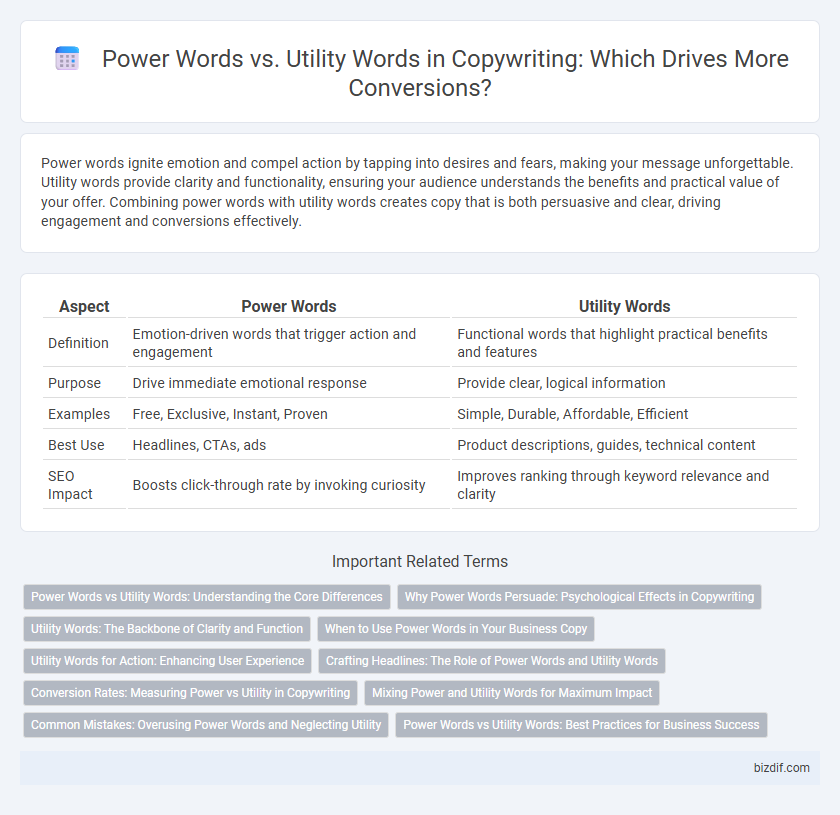Power words ignite emotion and compel action by tapping into desires and fears, making your message unforgettable. Utility words provide clarity and functionality, ensuring your audience understands the benefits and practical value of your offer. Combining power words with utility words creates copy that is both persuasive and clear, driving engagement and conversions effectively.
Table of Comparison
| Aspect | Power Words | Utility Words |
|---|---|---|
| Definition | Emotion-driven words that trigger action and engagement | Functional words that highlight practical benefits and features |
| Purpose | Drive immediate emotional response | Provide clear, logical information |
| Examples | Free, Exclusive, Instant, Proven | Simple, Durable, Affordable, Efficient |
| Best Use | Headlines, CTAs, ads | Product descriptions, guides, technical content |
| SEO Impact | Boosts click-through rate by invoking curiosity | Improves ranking through keyword relevance and clarity |
Power Words vs Utility Words: Understanding the Core Differences
Power words evoke strong emotions and drive immediate action by appealing to desires and fears, while utility words emphasize practical benefits and clear information, fostering trust through transparency. Power words like "discover," "amazing," and "guaranteed" ignite excitement and urgency, whereas utility words such as "how-to," "tips," and "guide" highlight usefulness and functionality. Understanding these core differences helps copywriters craft messages that either captivate audiences emotionally or inform them logically, depending on campaign goals.
Why Power Words Persuade: Psychological Effects in Copywriting
Power words trigger emotional responses by appealing directly to the reader's desires, fears, or aspirations, creating a sense of urgency and excitement in copywriting. These words engage the amygdala, the brain's emotional center, which heightens attention and increases the likelihood of persuasion. Utility words, while informative, lack this emotional impact and often fail to stimulate the same level of motivation or action in the audience.
Utility Words: The Backbone of Clarity and Function
Utility words play a critical role in copywriting by providing clarity, structure, and coherence to the message, ensuring the audience easily understands the content. These words serve as the backbone of functional communication, connecting ideas and supporting the flow of information without distracting from the primary message. Unlike power words that evoke emotion, utility words anchor the text in practicality, making the copy more accessible and effective for conveying key information.
When to Use Power Words in Your Business Copy
Power words evoke strong emotions and drive action, making them essential in headlines, CTAs, and sales pages where immediate engagement is crucial. Utility words provide clarity and practical information, best used in product descriptions and instructional content to build trust and transparency. Using power words strategically during promotional campaigns can significantly boost conversion rates by tapping into the audience's desires and fears.
Utility Words for Action: Enhancing User Experience
Utility words drive clear and direct action by simplifying instructions and reducing cognitive load, which significantly enhances user experience in copywriting. These words emphasize functionality and ease of use, guiding users intuitively through interfaces or content without confusion. Employing utility words such as "submit," "download," or "save" creates a seamless interaction, increasing user engagement and conversion rates.
Crafting Headlines: The Role of Power Words and Utility Words
Power words evoke strong emotions and compel action, making headlines more engaging and persuasive. Utility words emphasize practical benefits and functionality, enhancing clarity and relevance for readers. Combining power words with utility words in headlines maximizes impact by appealing both to feelings and logical needs.
Conversion Rates: Measuring Power vs Utility in Copywriting
Power words evoke strong emotions and urgency, significantly boosting conversion rates by capturing attention and prompting immediate action. Utility words emphasize practical benefits and clear information, appealing to logical decision-making and enhancing trust in the copy. Measuring their impact involves A/B testing different word choices to analyze click-through rates, engagement metrics, and overall sales performance, revealing that a strategic balance often maximizes conversion effectiveness.
Mixing Power and Utility Words for Maximum Impact
Combining power words like "unleash," "transform," and "exclusive" with utility words such as "how," "step-by-step," and "guide" creates compelling copy that engages emotion while delivering clear value. This strategic mix boosts conversion rates by capturing attention and providing actionable information, making messages both persuasive and practical. Marketers who master this balance can effectively motivate audiences and drive desired responses.
Common Mistakes: Overusing Power Words and Neglecting Utility
Overusing power words in copywriting can overwhelm readers and reduce credibility, leading to diminished engagement and trust. Neglecting utility words often results in unclear messaging that fails to communicate essential information or value effectively. Balancing persuasive power words with concise utility words ensures clarity and emotional impact, optimizing reader response and conversion rates.
Power Words vs Utility Words: Best Practices for Business Success
Power words evoke strong emotions and create urgency, making them essential for persuasive copywriting that drives conversions. Utility words provide clarity and factual information, establishing trust and credibility with the audience. Balancing power words with utility words maximizes engagement and achieves effective communication for business success.
Power Words vs Utility Words Infographic

 bizdif.com
bizdif.com